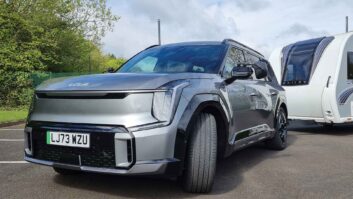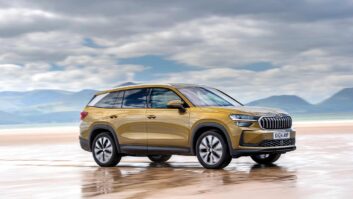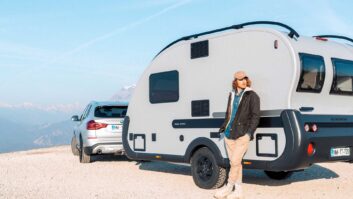The best caravan tow car will be stable and reliable, getting you and your tourer safely from A to B. However, towing takes a lot out of a vehicle and having enough muscle to pull a tourer while also remaining stable is a big ask. The very standout caravan tow cars, therefore, will need to combine a number of talents.
However, there are a lot of options on the market, and as a result, it can be hard to know how to go about finding the right car to tow a caravan. That’s where we come in.
Since Practical Caravan first launched in 1967, we’ve tested hundreds of tow cars, covering everything from small crossovers to family hatchbacks, roomy estates to big SUVs – we’ve seen them and we’ve reviewed them for their towing ability, helping our readers pick out the best option.
We also run the Practical Caravan Awards, where our expert judging panel identify the best caravans across a range of categories, as well as the towing options that have really impressed us.
Now, to help you choose the best caravan tow car, we’ve gathered our top picks. The biggest brands, from Kia and Land Rover to Škoda and Volkswagen all feature in our round-up, as we share our recommended cars for towing caravans that will provide reliability and stability on your travels. Whether you’re looking for a large SUV, a 4×4 or an electric option, there’s a car for towing a caravan in our guide that should suit you.
If you decide you’d rather buy a pre-owned towing vehicle, be sure to take a look at our guide to the best used tow cars too.
What is the best car to tow a caravan?
Land Rover Defender 110 D350 Sedona Edition
Kia Sorento 2.2 CRDi ‘3’
Mazda CX-80 3.3D AWD Exclusive Line
Škoda Superb Estate 2.0 TDI 150PS SE L
Polestar 3 Long Range Dual Motor
Volvo XC90 T8 AWD Ultra
Kia EV9 GT-Line 378bhp AWD
Volvo XC60 Recharge Plug-in Hybrid T6 AWD Plus
Kia EV6 GT-Line AWD
Land Rover Range Rover Sport D350 Autobiography
BMW X3 M40d
The best caravan tow cars:
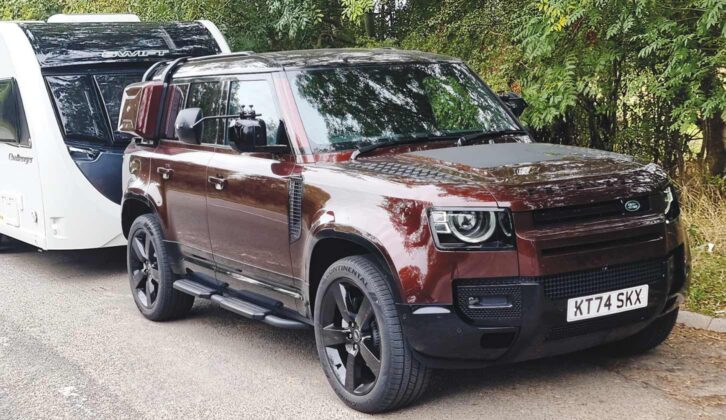
Land Rover Defender 110 D350 Sedona Edition
- Price: £84,470
- Kerbweight: 2436kg
- 85% of kerbweight: 2071kg
- Max towing limit: 3500kg
Reason to buy:
- Provides stable and composed towing, as well as plenty of pulling power
Reason to avoid:
- Expensive to run, spare wheel means tailgate needs opening when hitching up
When we put the latest Land Rover Defender to the test, it was hard to fault how well it towed, as it proved stable on a variety of types of road.
We think it would be a great tow car for anyone who owns a large tourer, thanks to its four-wheel drive, a weight of 2.5 tonnes, and the pulling power it provides.
Its 3.0-litre diesel’s 350hp is handy, but it’s the 536lb ft of torque that really impresses, and when we matched it to a tourer with a MiRO of 1549kg, the Defender was able to accelerate quickly, with its eight-speed automatic gearbox switching gears efficiently. Ok, the engine could sound a little gruff if pushed, but when cruising, we thought it was fairly quiet.
Country roads were fine to navigate, and we found this was a caravan tow car that towed incredibly well on a motorway, with our reviewer actually saying “it’s the kind of car that will happily tow all day without unduly fatiguing the driver”.
Reversing is simple too, thanks to the surround-view camera system, and Advanced Tow Assist should also make reversing a caravan a simpler prospect, by showing the tourer’s predicted path.
So far so good. One thing we did not like, however, was the fact that the full-size spare wheel would get in the way when you hitch up, unless the tailgate is open. We also thought the running costs were quite high, as the car achieved 32.2mpg on the combined cycle, which our reviewer labelled “poor”. However, on the towing economy route, it achieved what was labelled a more “respectable” 25mpg.
As a solo drive, it’s a comfortable car, not agile, but well-suited to relaxed driving. There’s also plenty of room inside, with comfortable seats up front. It’s good news for those in the back, too, with three able to travel without “elbowing each other”, as our reviewer put it. Luggage space impresses too, although the floor is high, unless you use the air suspension to lower it.
If you want a heavy tow car which will be stable on a variety of roads, and comes with plenty of pulling power, we think this is a tow car that is well worth considering.
Full review: Land Rover Defender 110 D350 Sedona Edition

Kia Sorento 2.2 CRDi ‘3’
- Price: £46,195
- Kerbweight: 1929kg
- 85% match figure: 1640kg
- Maximum towing weight: 2500kg
Reason to buy:
- An excellent tow car with good fuel efficiency
Reason to avoid:
- More agile options available
We named the updated Sorento the best car for towing a 1500kg caravan at the Practical Caravan Awards 2025, and continue to be impressed by it, as we shortlisted it at our 2026 Awards too.
It provided an excellent towing experience when we tested it, achieving a 5/5 from reviewer David Motton, who added “it offers 90% of a luxury SUV’s ability at 60% of the price”. Available as a hybrid, plug-in hybrid, or diesel, the refreshed SUV comes with new looks and interior tweaks.
We reckon the diesel type will be the best choice for caravanners because the plug-in hybrid and hybrid both offer reduced max towing limits (1010kg and 1110kg respectively), in contrast to the diesel’s 2500kg. We noted a bit of grumbling from the diesel engine, but think it’s well worth it for its towing capabilities, with its 325lb of torque ensuring it has plenty of muscle.
A case in point – after pairing it with a tourer with a MiRO of 1397kg, the Kia got to work, achieving a respectable 27.6mpg in the process. There may be quicker options, but it was still up to speed promptly, with its engine maintaining the speed without much revving. Hill starts are easy too, thanks to its pulling power, four-wheel drive and automatic gearbox.
While it may not be as unshakable as one of the best luxury 4x4s, our tester thought it “wasn’t far off”, adding it still felt “controlled and composed” when towing on a motorway. Campsite arrival is pleasant too, with the automatic gearbox allowing you to creep at low speeds.
It’s a straightforward solo drive, although not as agile as options such as a VW Tiguan, for instance, and you’re aware it’s a heavier car on winding country roads. It’s not a nimble option either, but it is comfortable and excels on the motorway, where wind and road noise are not felt. We liked that it’s not daunting to drive around town, missing that oversized feeling certain 4x4s can have.
Inside also impresses – here, a new infotainment system and dashboard are provided, while headroom and legroom are great, particularly for those in the front and middle row.
It provides an effortless towing experience and excellent fuel efficiency.
Full review: Kia Sorento 2.2 CRDi ‘3’
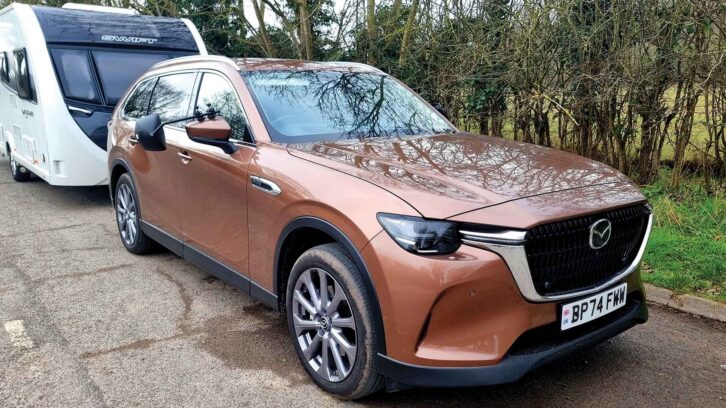
Mazda CX-80 3.3D AWD Exclusive Line
- Price: £52,205
- Kerbweight: 2061kg
- 85% of kerbweight: 1752kg
- Max towing limit: 2500kg
Reason to buy:
- Comes with plenty of kit as standard, driver-focused handling
Reason to avoid:
- Rivals are cheaper
This seven-seater from Mazda provides driver-focused handling, stable towing and a good list of standard kit. This makes it an attractive prospect to hitch up to a caravan, especially when you factor in a towing capacity of 2500kg.
With 406lb ft of torque, we found it pulled a Swift caravan with a MiRO of 1464kg confidently, holding its speed well and easily overtaking. Hilly roads were taken in its stride, and motorway speeds were not an issue. The Mazda actually comes with a towing setting, but we found it towed with stability regardless of whether it was in this mode.
It is available as a plug-in hybrid, but what we like about the diesel is that it provides more consistent fuel economy and better refinement.
As a solo drive, it handles well on a twisting road, too. It is a large tow car, coming in at just under five metres, but this means there is plenty of space inside and the front seats are supportive. The back seats might feel a little cramped, but there’s the option of using the middle row’s runners to increase the available room if you so desire. Boot capacity impresses too, with between 258-1971 litres available.
Something that we particularly liked was a rotary controller for the infotainment system as well, with the shortcut buttons making it simple to use the menus, so you can keep your eyes on the road.
There’s a good list of standard kit too, including 18-inch alloys, black leather seats, three-zone climate control, and more, which goes some way towards justifying the price. With mild-hybrid assistance, it returned 49.6mpg, but when towing, it achieved 27.6mpg.
Full review: Mazda CX-80 3.3D AWD Exclusive Line

Škoda Superb Estate 2.0 TDI 150PS SE L
- Price: £39,705
- Kerbweight: 1678kg
- 85% of kerbweight: 1426kg
- Maximum towing weight: 2000kg
Reason to buy:
- Offers a good towing experience, plenty of headroom and legroom provided, comes as a diesel
Reason to avoid:
- Tailgate opening isn’t flush with the boot
The Superb Estate takes what was already working well and improves it further. The Škoda has a few advantages over its rival, the VW Passat, including the fact that it’s available as both an estate and a hatchback, as well as with diesel power.
It comes with a 2.0-litre engine and offers 266lb ft of torque, and upon matching it to a tourer with a MiRO of 1352kg, we found the Škoda towed with ease, quickly reaching 60mph. Speed was held on hilly roads too – in fact, we felt like it almost had too much muscle, with wheel spin easy to come across when on a 1-in-10 slope. We loved how secure it felt, with our tester remarking he would ‘be happy to spend a long day towing with it, even in windy weather’.
We thought it provided a good solo ride around town too. It drives comfortably at speed, and beyond some road noise at 70mph, it was quiet. One thing we will highlight is that its size means a large parking space will be required, but the level of kit it comes with, including a rearview camera and both standard-fit front and rear parking sensors, help here.
We appreciate how everyone can travel in comfort too, with plenty of space upfront and great legroom in the rear. Due to a higher roof, headroom has also been improved.
Our only gripe was with the luggage space. While you now get an impressive 690 litres, the boot isn’t flush with the tailgate opening, so bags require lifting up and then lowering, unless you get the optional variable height boot floor for an extra £295, something which we think should be standard. However, fuel economy impresses, with 30.7mph seen when towing.
If you want a confident diesel towing option with good interior space, we reckon the Škoda could be the best caravan tow car for you.
Full review: Škoda Superb Estate 2.0 TDI 150PS SE L
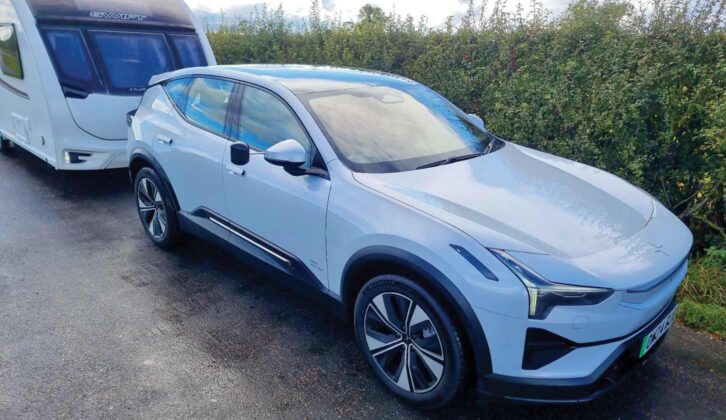
Polestar 3 Long Range Dual Motor
- Price: £75,910
- Kerbweight: 2579kg
- 85% of kerbweight: 2192kg
- Max towing limit: 2200kg
Reason to buy:
- Tows with stability and quick to accelerate
Reason to avoid:
- Premium price, door mirrors have nowhere to clamp conventional mirrors to
If you’re after a luxury SUV EV, we think the Polestar could be well worth considering, as it provides stability and efficient towing, always two of the traits we look for in the best cars for towing a caravan.
This five-seater is a heavy car, with a kerbweight of 2579kg, and unlike some EVs, which can have a relatively low towing capacity, it’s approved for 2200kg. Coming with 620lb ft of torque, the Polestar offers power and four-wheel-drive behind it too, and after we matched it to a tourer with a MiRO of 1419kg, it was quickly showing off its towing ability.
One minor gripe is that the mirrors are frameless, meaning there is no lip for a conventional towing mirror to clamp to. This aside, we found it towed well, accelerating quickly and maintaining speed on hilly roads without a problem. It’s very quiet too, to the extent that we’d actually recommend keeping an eye on the speed you’re travelling at, to avoid underestimating it. On a motorway, it tows well, with barely any movement felt in crosswinds or when going past lorries.
As a solo drive, it’s perfectly capable and can be driven with surprising agility for something of that size. One thing we did find was that visibility over the shoulder was poor, but when you’re parking, the cameras and sensors will help here.
We liked the contemporary interior. Ok, some may view it as a tad austere, but we thought it was smart. Most of the functions were accessed through a high-resolution touchscreen, and we were pleased to find it was straightforward to navigate, although we thought it made simple tasks, such as adjusting the mirrors, more fiddly than they needed to be. It’s spacious inside, and we thought the boot space was quite respectable too, coming in at 484 litres.
When we towed, we achieved a range of 178 miles, covering 1.667 miles per kW of electricity. Comfortable, practical and good at towing – there’s a lot to like about the Polestar.
Full review: Polestar 3 Long Range Dual Motor
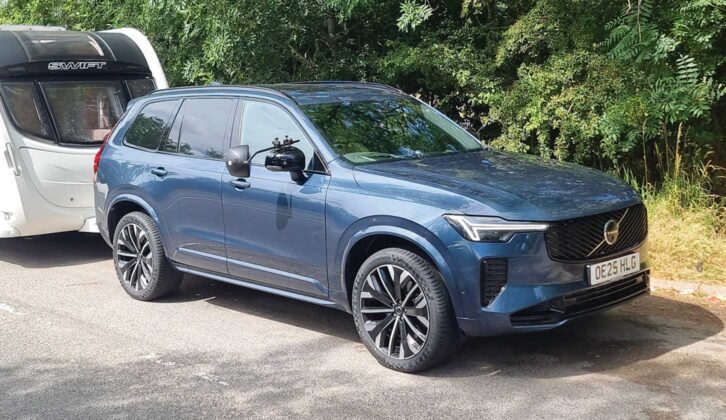
Volvo XC90 T8 AWD Ultra
- Price: £84,260
- Kerbweight: 2365kg (Listed as Mass in Running Order by Volvo)
- 85% of kerbweight: 2010kg
- Max towing limit: 2400kg
Reason to buy:
- Has a third row of seats, spacious interior, comfortable and stable
Reason to avoid:
- Expensive, roof box likely to be required if all rows are used
This luxury SUV may cost over £80,000, but it’s a vehicle which provides space, comfort and stability – could you want much more from one of the best caravan tow cars? The XC90 comes with a petrol engine with 310hp and an electric motor with 145hp, meaning it has plenty of punch for overtaking, even when towing a heavy tourer.
We matched it with a caravan with a MiRO of 1663kg, and found it was capable of pulling it solely on electric power for long periods, with the petrol motor only coming in when accelerating quickly or going uphill.
The plug-in hybrid weighs over two tonnes, so it unsurprisingly provided plenty of stability, even in windy conditions and on a motorway. A 1-in-10 slope proved no problem either, with the XC90 showing no wheelspin.
As an everyday car, it’s quick, switching between hybrid and electric smoothly. There may be a bit of road noise if you’re travelling at speed, but the ride is comfortable on the air suspension, so long as you’re not on broken surfaces. All-round visibility is good too, making the car’s length of just under 5m feel less intimidating. It’s not as sporty as the BMW X5 would be on a country road, but it’s still able to handle well. It’s when you head to a motorway that you will find it’s in what our reviewer called its “natural habitat”.
What we thought made this plug-in particularly stand out is that, unlike many of its rivals, it manages to keep its third row of seats, which puts it at an advantage for families looking for a larger tow car. It’s also quite airy at the back too, thanks to the large windows. However, if you do use all three rows, we reckon you’re going to need a roof box.
There’s no getting away from this tow car’s price, either, but we do think it makes a tax-efficient choice for company car drivers who don’t quite want to go completely electric yet, thanks to carbon dioxide emissions of 32g/km.
Full review: Volvo XC90 T8 AWD Ultra

Kia EV9 GT-Line 378bhp AWD
- Price: £73,275
- Kerbweight: 2648kg
- 85% match figure: 2251kg
- Maximum towing weight: 2500kg
Reason to buy:
- Comfortable and stable to drive
Reason to avoid:
- Range issues
For caravanners who want an electric tow car, the EV9 makes a very tempting choice, providing a comfortable drive and excellent stability.
A kerbweight of 2648kg makes it a very heavy tow car, which, when combined with its 378bhp and 516lb ft of torque, ensures you have a car which is both speedy and confident at towing. We tested it with two tourers, one with a MiRO of 1102kg and another with a MiRO of 1900kg. In the case of the former, it barely slowed the Kia, while with the latter, it was able to perform impressively, getting up to speed promptly on the motorway and having punch in the tank for overtaking.
Stability is always an important trait in the best cars for towing a caravan, and here, it stood out, with both wind and rain posing no issue. No wheelspin was felt from the 4×4 either, even on a 1-in-10 slope.
So far so good. However, pulling a tourer with an electric car is always going to present difficulties. Based on how we got on when towing the Adria, it would have a range of around 115 miles, based on its estimated usable battery capacity of 96kWh, meaning the battery would need recharging every two hours or so. While other factors such as warmer weather and a lighter caravan could alter this a bit, the recharge issue remains, particularly as you’re going to need to keep your tourer safe while the tow car tops up, which is where aids like the best caravan hitchlock can help.
However, it’s an incredibly smooth solo drive, handling neatly on twisting roads, even if there are other options which are more fun to drive. An acceleration of 0-62mph in only 5.3 seconds stands out too.
Inside, we thought space in the third row was good too, even for adults to use. Other cars, such as the BMW iX have crisper infotainment systems, but the EV9’s is straightforward to use. There’s also an impressive level of kit, including heated and ventilated seats, useful driving aids and an eight-speaker stereo.
Full review: Kia EV9 GT-Line 378bhp AWD

Volvo XC60 Recharge Plug-in Hybrid T6 AWD Plus
- Price: £60,055
- Kerbweight: 2163kg
- 85% match figure: 1828kg
- Maximum towing weight: 2250kg
Reason to buy:
- Spacious and stable
Reason to avoid:
- Other SUVs offer a better driving experience
This capable tow car not only comes with some subtle style changes but now offers extra features too, including a bigger battery for an all-electric range of up to 49 miles. We were impressed by its towing limit of 2250kg too, giving you plenty of freedom if you’re following the 85% guideline. When we tested it, we hitched it up to a tourer with a MiRO of 1497kg, and as we started towing, we found it had just over three-quarters of its charge left and an electric range of 34 miles. With the charge at a healthy level, it could easily tow on electric power alone, happily reaching 60mph.
However, we found towing essentially halved its electric range – after 17.5 miles, it primarily switched to petrol. It still performed well, offering brisk acceleration, although we did think it was noisier once the four-cylinder engine was at work.
Hill starts were no issue, with a 1-in-10 slope easy to face – a brief scrabble for grip was followed by confident towing when the conditions were wet. We found the stability very impressive too, providing a solid and confident experience, with the tourer only feeling the slightest nudge when around HGVs or similar. Fuel economy will vary, but we managed from 148mpg when charged up to 21.1mpg when the all-electric range was zero while towing.
One thing we will highlight is there are quieter and more comfortable SUVs to drive – other options are sharper too. The cabin is well-made though, as you would expect at this price point, with good space, although we will point out a hump in the back which could make it uncomfortable for three in the rear. The boot space was only 468 litres with the rear seats upright too.
However, we think the Volvo makes a capable choice, offering excellent stability, that all-important trait of the best tow cars, as well as speed and space.
Full review: Volvo XC60 Recharge Plug-in Hybrid T6 AWD Plus
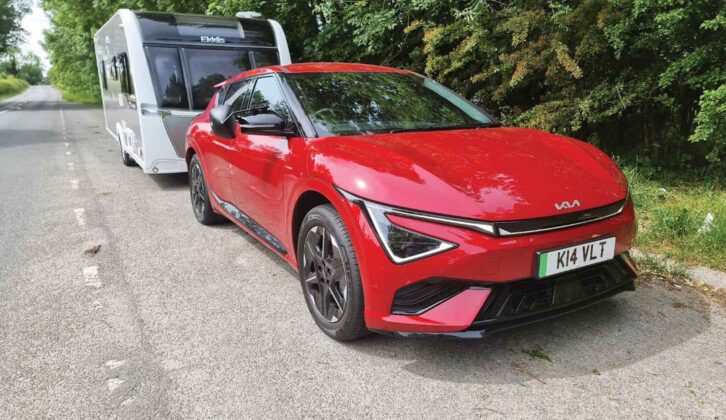
Kia EV6 GT-Line AWD
- Price: £52,085
- Kerbweight: 2150kg
- 85% of kerbweight: Above max tow
- Max towing limit: 1800kg
Reason to buy:
- One of the best EVs now made even better with its increased range and towing capacity
Reason to avoid:
- Better boot space provided in rivals
We thought the Kia EV6 GT-Line AWD was an excellent tow car when we put it to the test, with its enhanced range and towing capacity making what was already one of the best EVs an even better proposition.
Its previous towing capacity stood at 1600kg, but the updated model has risen to 1800kg, helping it bypass what can be an issue with some EVs. However, one thing that will still be an issue is charging an electric car while towing a caravan.
That aside, the EV6 is impressive. We hitched it up to a tourer with a MiRO of 1373kg, and it was soon towing on a motorway at 60mph with ease. There may be quicker EVs available, but it can move confidently, and more importantly, tow with stability. Here, only the tiniest of movements were felt from the tourer, with crosswinds and HGVS posing no issue.
We also liked how seamlessly the gearbox moves down to a lower gear, thanks to the transmission having a single speed when moving forward. We found the sporty but comfortable suspension helped the EV6 stay in control on country roads too, with no signs of strain, while hill starts also proved straightforward.
Rear visibility may not be fantastic, but we found it wasn’t an issue, thanks to the excellent rear-view camera, while four-wheel drive will be useful when navigating damp conditions, too.
It’s a satisfying solo drive. The interior is spacious, including in the back, where you get ample legroom. Boot capacity of 490-1300 litres could be better, though – while respectable, it is an area where some of its rivals surpass it.
However, we like how it’s well-equipped, with plenty of luxury kit and safety aids. Its new battery gives it a range of 339 miles, and when towing, we found it was around 140 miles.
Full review: Kia EV6 GT-Line AWD

Land Rover Range Rover Sport D350 Autobiography
- Price: £104,275
- Kerbweight: 2360kg
- 85% match figure: 2006kg
- Maximum towing weight: 3500kg
Reason to buy:
- Provides excellent stability and power
Reason to avoid:
- There’s no avoiding the price, doesn’t have a third row of seats
Our pick for the best tow car for a 2000kg caravan at the Practical Caravan Awards 2025 retained its title at our 2026 Awards and is a car for towing a caravan that we think offers plenty of power and an exceptional towing experience. It’s expensive, coming in at over £100,000, but provides plenty of stability at speed, with 350hp making it capable of towing heavyweight twin-axles.
We will point out that it may not suit the needs of larger families who want that third row of seats. However, steep hills are easy to negotiate and bad weather will not pose an issue either, thanks to the tow car’s power and four wheel drive.
We were also impressed by how it manages to combine plenty of comfort with a great performance. It has the added benefit of being cheaper than the typical Range Rover, yet also manages to be more enjoyable to drive. Fuel economy is respectable too. There’s no getting away from the price, but this is a towing car which has a lot going for it.
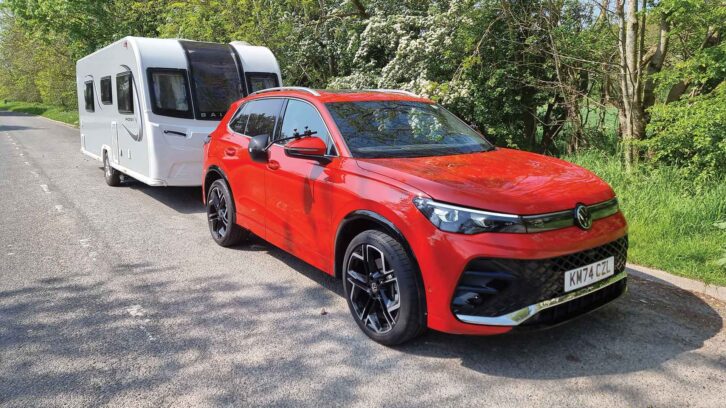
Volkswagen Tiguan 2.0 TSI 265PS R-Line 4Motion
- Price: £50,220
- Kerbweight: 1753kg
- 85% of kerbweight: 1490kg
- Max towing limit: 2200kg
Reason to buy:
- Tows very well, infotainment is simple to use
Reason to avoid:
- Expensive to run
The petrol Tiguan is a 4×4 which is capable of pulling a caravan with stability and makes a fine car to tow a caravan. That is, so long as you’re not looking to prioritise fuel economy. It has 295lb ft of torque, matching the pulling power seen in top-spec diesels such as the Skoda Kodiaq 4×4, and after hitching it up to a tourer with a MiRO of 1240kg, it towed at speed with confidence.
It doesn’t take long to reach 60mph, at which point we found the Tiguan was very stable, with barely any movement to be felt, whether in ‘comfort’ mode or ‘sport’. Hill starts, both on a 1-in-10 and 1-in-6 slope, were simple, and the reversing camera gave a clear view of the towball, so hitching up was stress-free.
As a solo drive, it’s just as good, whether being driven on a country road or for carrying out the school run. Navigating multi-storey car parks will make you notice the more compact length of the Tiguan, which comes in at just over 4.5m. It’s quick on motorways as well, but we found the 20-inch wheels meant there could be a fair bit of road noise.
We liked that the infotainment system has been improved, proving quick in response and, pleasingly, straightforward to use. There is also good space, both in the front and back, although look out for the transmission tunnel if anyone will be sitting in the middle of the rear three.
However, it will be fairly expensive to run, with an official combined figure of 33.2mpg, while 22.9mpg was achieved when towing.
Full review: Volkswagen Tiguan 2.0 TSI 265PS R-Line 4Motion
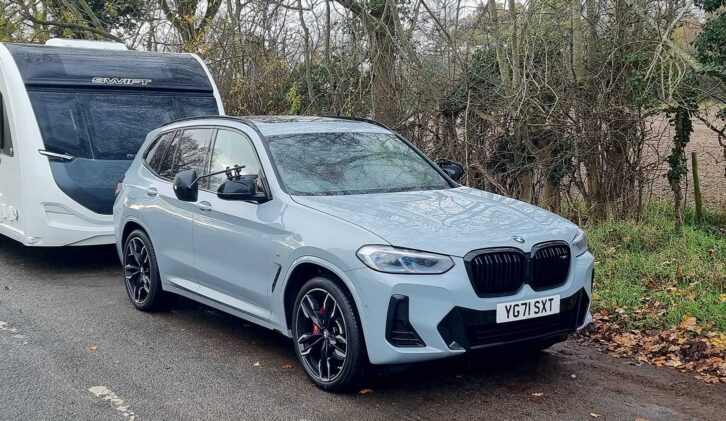
BMW X3 M40d
- Price: £62,785
- Kerbweight: 2080kg
- 85% match figure: 1768kg
- Maximum towing weight: 2400kg
Reason to buy:
- A pleasure to drive, whether towing or as an every-day car, plenty of torque and power, surprisingly frugal
Reason to avoid:
- At over £60,ooo, it’s quite a pricy option to consider
You’re entitled to want a lot to justify the price tag, but we found towing with the most powerful diesel in the X3 range an absolute pleasure. Stability and speed are hallmarks of the best caravan tow cars, two things that this BMW certainly offers.
The SUV’s kerbweight of 2080kg means it has an 85% match figure of 1768kg, and it towed a caravan with a MiRO of 1505kg with ease. Both a hill start on damp Tarmac and maintaining speed on a hill proved no problem, with its four-wheel-drive system up to the challenge.
Both crosswinds and high-sided vehicles posed no issue either – in fact, the only wobble was felt when a larger van overtook at speed, and we were quickly able to pull it straight. Hitching up a caravan is also simple, as this BMW is well-equipped to deal with low-speed manoeuvres.
When it comes to solo driving, this is one of the quickest cars we’ve towed, going from 0-62mpg in only 4.9 seconds. Sporty suspension does mean bumps in the road will be felt, but we liked the excellent control it provides at speed.
This is also very well-equipped, with a spec including 21-inch alloys, heated front seats, a rear parking camera and acoustic glass. It’s surprisingly frugal for such a heavy car too, as we achieved 41-43mpg for everyday use and 25.2mpg when towing.
There’s no getting away from it – this is an excellent caravan tow car, with plenty of power and torque. If you have the budget for such a roomy and powerful car, you’re sure to enjoy towing in this BMW.
Full review: BMW X3 M40d
What do I need to know before I buy the best caravan tow car?
To stay within the law, your car needs to have a legal towing limit that will either match or surpasses your caravan’s loaded weight – for instance, if your caravan weighs 1500kg, your car will need a towing limit of at least 1500kg.
A car’s legal maximum is based on its ability to tow a trailer up a slope repeatedly, so it shouldn’t be assumed that because a car can legally tow, say, 2500kg, it’s going to be wise to tow something that heavy at 60mph on the motorway on a windy day.
As a result, it’s recommended by the two main caravanning clubs that you tow no more than 85% of the tow car’s kerbweight. You can then work out the maximum weight of the caravan you can tow to stick to the 85% guideline by taking the tow car’s kerbweight and multiplying it by 0.85. For legal towing, this figure should not exceed the car’s towing limit.
Our guide to the licence you need to tow a caravan will also talk you through all you need to know to make sure you have the correct licence.
What should I be looking for in the best tow car?
When you’re choosing the best cars to pull a caravan, the important things to consider will be the safety, economy, practicality and value. However, the most important quality will be stability. It’s not always easy to assess, based solely on the spec, but combining this with a test drive can be helpful.
Even if the test drive doesn’t see you towing a caravan, you can still look out for certain signs – are you getting a firmly controlled ride? Does the suspension recover straight away?
You can find out more about what to look out for in our guide to how to choose a tow car.
How we choose the best caravan tow cars
Practical Caravan launched in 1967, and since then, our experts have conducted hundreds of tow car tests, covering everything from small crossovers to family hatchbacks, roomy estates to big SUVs. Many of these can be seen in our tow car review section.
Every vehicle we feature in this round up will have been seen, tried out and experienced by our team, allowing us to make sure the models we’ve selected do provide the most important tow car qualities.
Some of the factors we consider include the safety and stability of the car, the fuel economy it offers, the practicalities of using it as both a towing vehicle and for everyday use, plus whether it makes financial sense to buy.
Putting this all together, and comparing it with other models we’ve tried out, puts us in an authoritative position to pick out the caravan tow cars that we think are the best options on the market.
If you’ve enjoyed reading this article, why not get the latest news, reviews and features delivered direct to your door or inbox every month. Take advantage of our brilliant Practical Caravan magazine SUBSCRIBERS’ OFFER and SIGN UP TO OUR NEWSLETTER for regular weekly updates on all things caravan related
Having enough muscle to pull a tourer and the poise to remain stable while doing so is a big ask. The very standout caravan tow cars, therefore, will need to combine a number of talents.






